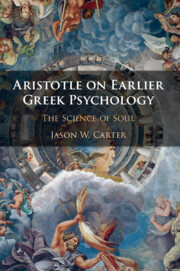Book contents
- Aristotle on Earlier Greek Psychology
- Aristotle on Earlier Greek Psychology
- Copyright page
- Dedication
- Contents
- Acknowledgements
- Abbreviations
- Introduction to Hylomorphic Psychology
- Part I Aristotle’s Methodology of Psychological Inquiry
- Part II Earlier Theories of Psychological Motion
- Part III Earlier Theories of Psychological Cognition
- Chapter 7 Empedocles’ Psychology
- Chapter 8 Anaxagoras’ Psychology
- Part IV Earlier Theories and Two Psychological Puzzles
- Conclusion: Hylomorphic Psychology as a Dualism
- Bibliography
- Index Locorum
- General Index
Chapter 7 - Empedocles’ Psychology
from Part III - Earlier Theories of Psychological Cognition
Published online by Cambridge University Press: 08 March 2019
- Aristotle on Earlier Greek Psychology
- Aristotle on Earlier Greek Psychology
- Copyright page
- Dedication
- Contents
- Acknowledgements
- Abbreviations
- Introduction to Hylomorphic Psychology
- Part I Aristotle’s Methodology of Psychological Inquiry
- Part II Earlier Theories of Psychological Motion
- Part III Earlier Theories of Psychological Cognition
- Chapter 7 Empedocles’ Psychology
- Chapter 8 Anaxagoras’ Psychology
- Part IV Earlier Theories and Two Psychological Puzzles
- Conclusion: Hylomorphic Psychology as a Dualism
- Bibliography
- Index Locorum
- General Index
Summary
- Type
- Chapter
- Information
- Aristotle on Earlier Greek PsychologyThe Science of Soul, pp. 143 - 167Publisher: Cambridge University PressPrint publication year: 2019



